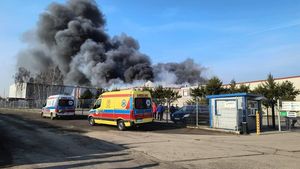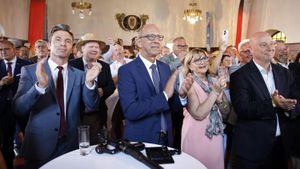On the eve of the Foibe Remembrance Day, which commemorates the victims of the violent crimes committed during and after World War II, Italy finds itself grappling with the scars of history. This year, the memory of those lost was marred by acts of vandalism at the Basovizza Foiba, located near Trieste, where graffiti was spray-painted declaring, "Trst je nas" (Trieste is ours), among other slogans, just days before the memorial day.
Prime Minister Giorgia Meloni expressed her outrage over the act, stating, "The Basovizza Foiba is a sacred place, a national monument, to be honoured with silence and prayer. Offending Basovizza, with repugnant writings... does not only trample on the memory of the martyrs of the Foibe, but it is also an outrage to the entire nation." Meloni emphasized the importance of safeguarding the memory of those who suffered under Tito's Yugoslav Partisans during their occupation of the Istrian peninsula, which led to the deaths of thousands of Italians between 1943 and 1945.
The Basovizza Foiba itself serves as both a memorial and remnant of the atrocities committed, classified as natural pit-like sinkholes used by partisans to dispose of the bodies of victims. Although estimates suggest up to 15,000 Italians, many identified with Fascism, suffered during this dark chapter, the exact numbers remain unknown due to the destruction of local population records by Tito's forces. This historical episode has long remained shrouded, with the tragic events only officially recognized through the establishment of Foibe Remembrance Day on February 10, 2004.
This year's graffiti incident follows closely the February 10 memorial observances throughout Italy, which encourage public reflection and recognition of the Foibe victims who were tortured and killed simply for their Italian heritage. The timing of the incident has sparked renewed tensions around the observance, with various leaders denouncing the act as fundamentally disrespectful.
Roberto Menia, a senator from the Fratelli d'Italia party and proponent of the law establishing the Remembrance Day, condemned the graffiti, stating, "This episode demonstrates the necessity and duty to preserve the memory of this great historical wound, which still today is barbarically reopened." His sentiments echoed throughout the political spectrum, with figures from across the aisle expressing their discontent at what they perceive as increasing negationism surrounding the historical events of the Foibe massacres.
Civic commemorations are slated to take place as part of the national observance, including ceremonies organized by youth groups from Fratelli d'Italia across provinces like Pisa. These initiatives aim to remind the younger generations of the struggles endured by their families and fellow citizens. Edoardo Coltelli, one of the youth leaders, said, "We invite all citizens, young and old, to participate... so we can preserve the memory of this tragedy which must never be forgotten."
With events scheduled to occur not only at the Basovizza Foiba but also throughout Rimini and Riccione, the public will have multiple opportunities to engage with this solemn remembrance. The ceremonies include moments of silence, memorial speeches, and the laying of wreaths, as the community gathers to honor the legacy of those affected by the atrocities.
The unity displayed during these commemorations stands as a stark reminder against the backdrop of vandalism and division, highlighting the desire for collective healing and acknowledgment of the past. Meloni reiterated this point, assuring citizens, "What happened is an act of unprecedented gravity, which cannot go unpunished. Our commitment to preserving these memories is unwavering, as we seek to build bridges for future generations, grounded in truth and reconciliation."
Recognizing the emotional resonance these events hold for many families still bearing scars from their ancestors' experiences during and after World War II, today’s observances are both painful and necessary. They reaffirm Italy's commitment to healing and remembrance, against the forces of historical denial and division, aiming for collective recognition of trauma shared across generations.



